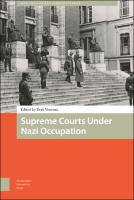Supreme Courts Under Nazi Occupation
Contributor(s)
Venema, Derk (editor)
Language
EnglishAbstract
This is the first extensive treatment of leading judicial institutions under Nazi rule in WWII. It focusses on all democratic countries under German occupation, and provides the details for answering questions like: how can law serve as an instrument of defence against an oppressive regime? Are the courts always the guardians of democracy and rule of law? What role was there for international law? How did the courts deal with dismissals, new appointees, new courts, forced German ordinances versus national law? How did judges justify their actions, help citizens, appease the enemy, protest against injustice? Experts from all democracies that were occupied by the Nazis paint vivid pictures of oppression, collaboration, and resistance. The results are interpreted in a socio-legal framework introducing the concept of ‘moral hygiene’ to explain the clash between normative and descriptive approaches in public opinion and scholarship concerning officials’ behaviour in war-time.
Keywords
Judiciary, enemy occupation, second World War, National Socialism, collaborationDOI
10.5117/9789463720496ISBN
9789463720496, 9789048557103Publisher
Amsterdam University PressPublisher website
https://www.aup.nl/Publication date and place
Amsterdam, 2023Series
War, Conflict and Genocide Studies, 7Classification
Second World War
Modern warfare
c 1938 to c 1946 (World War Two period)
Legal systems: courts and procedures
Political structures: totalitarianism and dictatorship


 Download
Download Web Shop
Web Shop